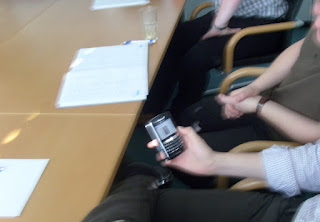 There have been some rather hot and heavy discussions recently about whether or not it's a good idea to use technology in teaching.
There have been some rather hot and heavy discussions recently about whether or not it's a good idea to use technology in teaching.And if you're a regular visitor to my blog then you pretty much already know what I think.
For those who're new: I drum it in hard and heavy. It's the world we live in, it's the world we better be teaching in.
This time, though, I won't be socking you with my opinions. I'll just show you the result.
For those who don't know any back story, I'm very proudly a dogmeist which is a kind of radical movement in teaching, started up by Scott Thornbury back in 2000 (see his website and articles here).
Dogme has the goal of student-centered learning, conversation-driven lessons and a clear focus on emergent language.
Trouble is, I'm also a technologist and most dogmeists aren't.
Now, although Scott Thornbury is my thought leader (there really isn't anyone else like him or his work in our field) we've had a few, somewhat public, arguments about the tech side of things.
I enjoy these discussions - he makes valid points which force me to up my anty each time: just because I think I'm right, doesn't mean that I am.
Being wrong is a point of growth and opportunity to develop - it's specifically because of these arguments, every time they flare up, that I keep copious notes on what's happening in the classroom, how my students are responding, how much they're retaining, where they're improving and constantly question my teaching practice and its effectiveness.
Being wrong is a point of growth and opportunity to develop - it's specifically because of these arguments, every time they flare up, that I keep copious notes on what's happening in the classroom, how my students are responding, how much they're retaining, where they're improving and constantly question my teaching practice and its effectiveness.
Today's post is about student motivation in my hybrid dogme meets technology teaching.
This blog mostly contains lessons I've done again and again, things that I have experimented with way before you get to see them ;-) however today... I'm going to go out on a wing and admit I don't know what my students will produce next week.
Today, I'll simply ask you to look at the level of motivation my students are displaying due to the fact that we focus on things that they are interested in learning, work on language they need to learn and reuse this in ways applicable to their lives.
We use technology when it fits to do so, not because it's fancy.
Today, I'll simply ask you to look at the level of motivation my students are displaying due to the fact that we focus on things that they are interested in learning, work on language they need to learn and reuse this in ways applicable to their lives.
We use technology when it fits to do so, not because it's fancy.
Part 1
Language objective:
Mastery over phrases used in statistical reporting /Financial English.
In class procedure:
- Get each student to draw trend expressions as given onto large sheets of paper then present to the rest of the class. If we had had computers in class with us that day, these could have been done in excel.
- Discussion and agreement /disagreement. Building contextual examples.
- Cross checking via BlackBerry for expressions when validity of use uncertain.
The expressions in drawings:


Setting up the pretask activity:
(I dislike the word homework)
Brainstorm potential sources for reports.

Pre Task
Find pre-existing graphs, pie-charts, annual reports and download from the internet, preferably in English but not necessarily.
The task is not to create a graph (they know how to do that) but instead to choose any figures and trends personally interesting and think about how to best describe change.
Next week we'll discuss their findings in English.
The task is not to create a graph (they know how to do that) but instead to choose any figures and trends personally interesting and think about how to best describe change.
Next week we'll discuss their findings in English.
Student involvement
See emails from Eva, the self appointed moderator, who decided to make sure that all students (including those missing) are on the same page for next week. I did not request for this email to be written, although I wasn't surprised to see it - she often follows up on the lessons.



We live in a world with email. We live in a world where digital photographs can be taken and shared, where .pdfs can be downloaded and distributed.
We live in a world where our phones are micro-sized computers.
We live in a world where the wheel doesn't have to be reinvented but can instead be analyzed - where the focus in language learning can actually be on the language.
Next week I will show you what happens next In Task - what they produce, if they reused the language, how they present these and anything else.
Best,
Karenne
p.s. Can I just say this cracks me up: Hi English Fans! My German/Polish students in this class are aged 40+ and work in the Financial sector.










0 Responses to “Hi English Fans! (Motivation in Adult EFL)”
Post a Comment